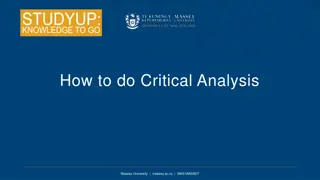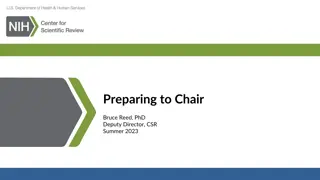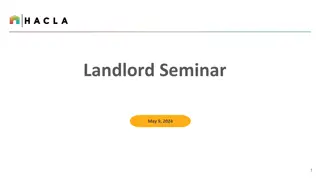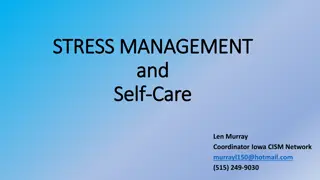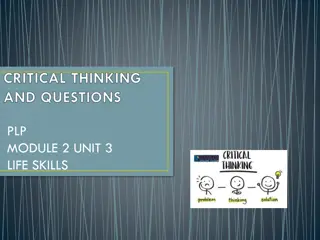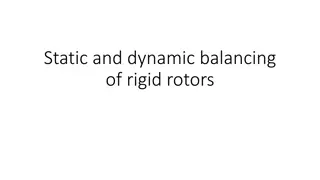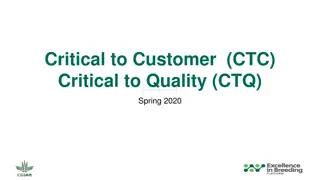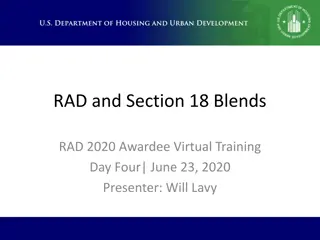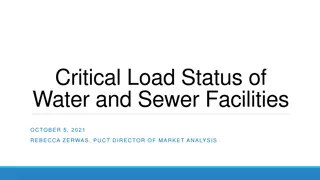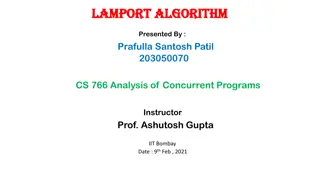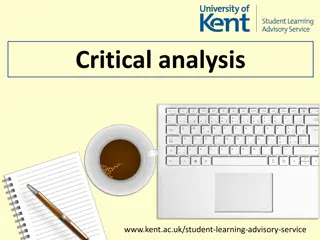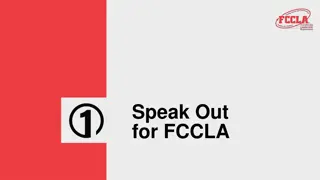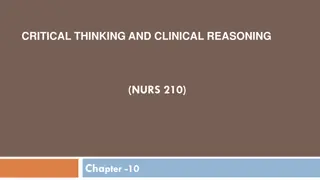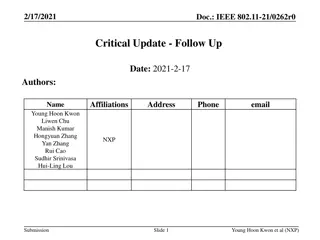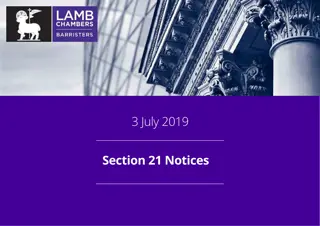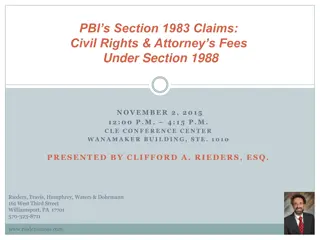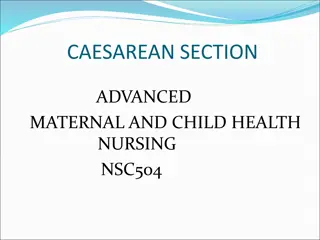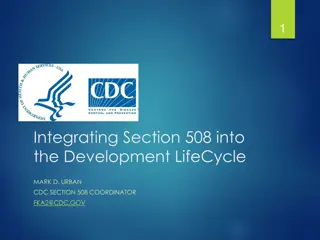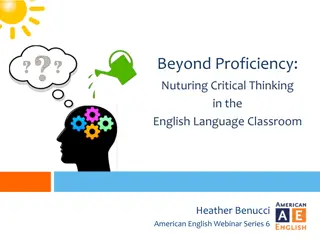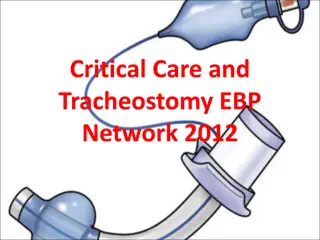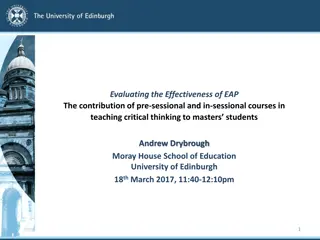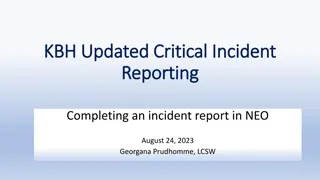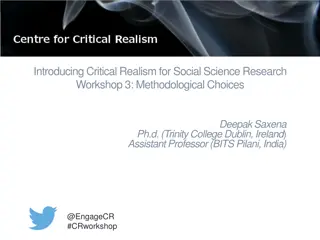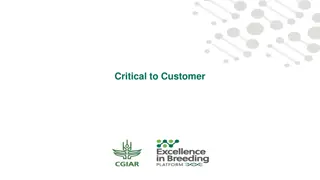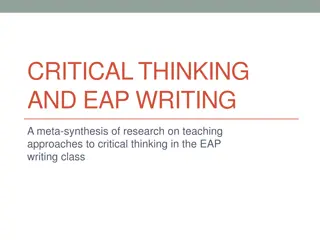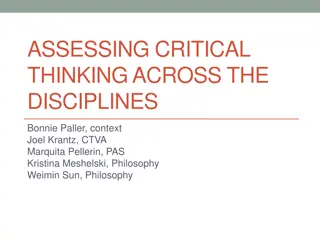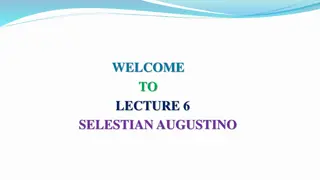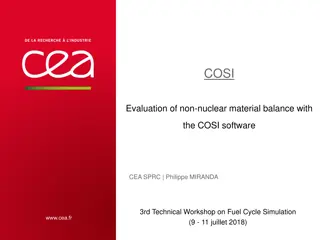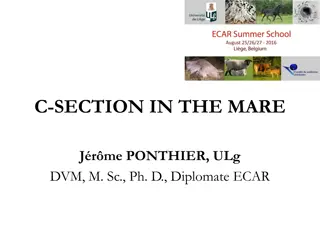Understanding Critical and Non-Critical Incidents in Incident Reporting
Critical incidents, as defined by regulations, are serious events that pose immediate risk to health, safety, or welfare. Non-critical incidents, on the other hand, are minor in nature and do not have serious consequences. Incident reports play a crucial role in documenting occurrences, identifying
0 views • 29 slides
Scope of Jurisdictional Challenge in Income Escaping Assessment Proceedings
The jurisdictional challenge of income escaping assessment before the Gujarat High Court involves Sections 147 and 148A of the Income Tax Act. Section 147 allows the Assessing Officer to assess or reassess income that has escaped assessment for any assessment year, while Section 148A outlines the pr
1 views • 25 slides
Augmented Approach for Ed-Fi Section Model Enhancements
Exploring alternative definitions for the Ed-Fi Section model, focusing on addressing issues arising from new instructional models like multiple course offerings per section and flexible student participation. The recommended approach involves augmenting the Course Transcript to provide a more flexi
11 views • 8 slides
How to do Critical Analysis
Massey University provides valuable insights on critical analysis, distinguishing between description and analysis, evaluating evidence and reasons, and making strong arguments. Critical thinking involves evaluating evidence to reach informed conclusions, surpassing mere understanding. While descrip
0 views • 22 slides
How Can I cancel my Wizz Air flight within 24 hours of booking?
To cancel your Wizz Air flight within 24 hours of booking, the Wizz Airlines Flight Cancellation Policy allows for easy cancellation through the \"My Booking\" section on their website.\nVisit the Website: Go to the Wizz Air official website.\nMy Booking Section: Access the \"My Booking\" section.\n
1 views • 7 slides
Roles and Responsibilities of Study Section Chair and Meeting Participants
Understanding the distinct roles of study section chairs and meeting participants is crucial for effective research proposal evaluation. The study section chair leads discussions and implements policies, while meeting participants, including the Scientific Review Officer (SRO) and reviewers, play co
4 views • 14 slides
Overview of Landlord Seminar on May 9, 2024 - Housing Assistance Programs and Regulations
Explore the comprehensive agenda of the landlord seminar scheduled for May 9, 2024, covering topics like Violence Against Women Act (VAWA), Source Of Income Protections, State Laws, Housing Choice Voucher Program (HCVP) overview, Section 8 program details, and more. Learn about the Housing Authority
0 views • 38 slides
Understanding Critical Incident Stress Management (CISM)
Critical Incident Stress Management (CISM) is crucial for addressing the emotional, physical, and psychological reactions to overwhelming events. This includes definitions of critical incidents, CISM teams, peer support, and crisis response teams. Learn how the International Critical Incident Stress
2 views • 25 slides
Enhancing Critical Thinking Skills Through KWHL Chart
Critical thinking entails questioning and seeking more information before accepting ideas. The KWHL chart method is introduced to improve critical thinking skills, encouraging students to note what they know, what they want to learn, how they can learn more, and what they have learned. Engaging in a
0 views • 5 slides
Understanding Rigid Rotor Balancing and Critical Speed
Explore the concepts of static and dynamic balancing of rigid rotors, determining when a rotor can be assumed rigid based on speed, examining Jeffcott rotor critical speed problems, and discussing the simplest model of rotor systems. Learn about rotor imbalance, free vibrations, natural frequency, a
1 views • 29 slides
Understanding Critical to Customer (CTC) and Critical to Quality (CTQ)
Quality is determined by meeting customer needs. Critical to Customer (CTC) Flowdown translates these needs into Critical to Quality (CTQ) aspects. This tool helps organizations identify what is critical to meet customer expectations, serving as a communication tool and guiding improvement projects.
2 views • 10 slides
RAD and Section 18 Blends Virtual Training Overview
Explore the synergy between RAD and Section 18 in public housing redevelopment and preservation strategies. Learn about Section 18 requirements, project-based vouchers, portfolio repositioning, and HUD's encouragement for PHAs to utilize a combination of RAD and Section 18. Discover tools like the 7
0 views • 20 slides
Critical Load Status of Water and Sewer Facilities - Filing Requirements and Impacts
Water and wastewater utilities in Texas are required to provide critical load status information to various entities by November 1, 2021. The Senate Bill 3 of the 87th Legislature outlines the filing requirements and impacts on electric utilities and Retail Electric Providers (REPs). The process inv
2 views • 4 slides
Critical Thinking in Islamic Methodology
Explore the concept of critical thinking in Islam, identifying key skills and understanding the importance of constructive criticism. Delve into the methodology of thinking in Islam that transcends superficial understanding, enabling individuals to distinguish between good and bad, correct and incor
2 views • 12 slides
Understanding Lamport Algorithm for Mutual Exclusion
Lamport Algorithm, presented by Prafulla Santosh Patil, is a permission-based algorithm utilizing timestamps to order critical section requests and resolve conflicts. It employs three types of messages: REQUEST, REPLY, and RELEASE, where each site manages a queue to store requests. By ensuring commu
0 views • 15 slides
Mastering Critical Analysis in Higher Education
Developing a critical approach is crucial for higher education students to enhance knowledge, problem-solving skills, and idea development. This skill involves analyzing sources, evaluating credibility, and identifying key elements. Explore the differences between descriptive and critical analysis,
1 views • 11 slides
Exploring Critical Thinking in a Digital Society
Delve into the realm of critical thinking in the modern era, where information is readily available. Discover how easy access to data impacts our ability to think critically. Explore the importance of critical thinking and its application in today's society. Learn about the six-step critical thinkin
0 views • 32 slides
Unlocking Critical Reading Skills: Strategies and Techniques
Enhance your reading comprehension through critical reading practices. Understand the definition of critical reading, its importance in the reading process, and learn practical steps to become a critical reader. Discover how critical reading fits into the C.A.R.E. model and the benefits it brings to
0 views • 26 slides
Enhancing Critical Thinking and Clinical Reasoning in Nursing Practice
Nursing students will gain insights into critical thinking techniques and the integration of clinical reasoning in problem-solving. The importance of critical thinking for identifying client issues, implementing effective interventions, and promoting care outcomes is emphasized. Techniques like crit
0 views • 36 slides
IEEE 802.11-21/0262r0 Critical Updates Discussion Summary
The document discusses critical updates related to IEEE 802.11-21/0262r0, focusing on changes in system information for APs within an AP MLD. It addresses scenarios where non-AP STAs receive Beacon frames with direct inclusion events, potential issues with updating critical information, and proposes
0 views • 9 slides
Understanding Section 21 Notices: A Comprehensive Guide for Tenant Advisors
Elizabeth Dwomoh, an expert property practitioner, offers a seminar on Section 21 Notices under the 1988 Act. The aim is to educate tenant advisors on serving notices and evictions using the Section 21 Procedure. The seminar covers topics like prohibitions, procedures, and the legal requirements for
0 views • 35 slides
Understanding Section 1983 Claims and Civil Rights Attorney Fees
Section 1983 of the Civil Rights Act allows individuals to seek redress for violations of their constitutional rights by persons acting under state law. This provision does not create new rights but provides remedies for existing rights. The history of Section 1983 dates back to 1871 and has been in
0 views • 27 slides
Comprehensive Overview of Caesarean Section and Uterine Anatomy
Caesarean section (C/S) is an operative procedure done under anesthesia to deliver the fetus, placenta, and membranes through an incision in the abdominal wall and uterus. The history of C-section dates back to the 17th century, with significant advancements in the modern era. Understanding the anat
1 views • 60 slides
Mastering Critical Writing for MA Students: A Guide to Enhancing Academic Skills
Enhance your critical writing skills with this comprehensive guide tailored for MA students. Explore critical thinking, understanding arguments, critical reading, and effective writing techniques. Develop original ideas, create valid arguments, and engage in analysis to boost your academic performan
0 views • 20 slides
Integrating Section 508 into the Development Life Cycle by Mark D. Urban
Mark D. Urban, CDC Section 508 Coordinator, discusses the importance of integrating Section 508 into the development life cycle. The presentation covers topics such as the basics of a life cycle, classic vs. modern development methods, authoring tools, validation, and the unique considerations for m
0 views • 16 slides
Enhancing Critical Thinking Skills in the English Language Classroom
Explore the importance of nurturing critical thinking skills in the EFL classroom through understanding the essence of critical thinking, discussing its definitions, and embracing practical ideas for implementation. Delve into the process of critical thinking, integrating Bloom's Taxonomy to foster
0 views • 50 slides
Evidence-Based Practice in Critical Care: Focus on FEES in Dysphagia Management
This presentation outlines the activities of the Critical Care and Tracheostomy EBP Network in 2012, including a review of the year, changes in leadership, and discussions on the use of Fiberoptic Endoscopic Evaluation of Swallowing (FEES) in critical care settings. Various research articles are dis
0 views • 16 slides
Edexcel IGCSE First Language English Paper 1 Overview
Paper 1 of Edexcel's IGCSE First Language English assesses reading and writing skills. The examination consists of a reading section and a writing section. In the reading section, students engage with various texts and answer comprehension questions. The writing section offers different tasks like n
0 views • 16 slides
Effectiveness of EAP in Teaching Critical Thinking to Masters Students
This presentation by Andrew Drybrough evaluates the contribution of pre-sessional and in-sessional courses in teaching critical thinking to masters students. It discusses the importance of critical thinking skills in EAP, examines the responsibilities of various stakeholders, addresses the audience
0 views • 27 slides
Understanding Section 1 of the Canadian Charter of Rights and Freedoms
Exploring the history, purpose, and interpretation of Section 1 of the Canadian Charter of Rights and Freedoms. This section discusses the balancing act of limiting rights for societal well-being, notable events like the Hays-Joyal Joint Committee hearings, and perspectives from individuals like Ala
0 views • 47 slides
Understanding Critical Incident Reporting in Behavioral Health Services
Behavioral health services providers like KBH are required to report and track critical incidents and sentinel events in order to ensure client safety and program integrity. This involves identifying trends, reporting abuse, and following specific reporting processes set by accrediting bodies. The N
0 views • 29 slides
Exploring Critical Realism for Social Science Research: Methodological Perspectives
Delve into the methodological choices and key concepts of Critical Realism for social science research, including the nature of reality, researcher-inquirer relationships, and assumptions about human agency. Learn about the domains of reality in Critical Realism and the distinction between qualitati
0 views • 10 slides
Understanding Critical Customer Needs for Project Success
Explore the concept of Critical to Customer (CTC) by identifying the essential features necessary to satisfy both internal and external customers. Learn how to apply techniques like CTC Flowdown and determine Critical to Quality (CTQ) factors. Discover how to develop a CTC tree to link project outpu
0 views • 9 slides
Enhancing Critical Thinking: Strategies and Practices Across Disciplines
Explore the multifaceted dimensions of critical thinking in teaching and learning across various disciplines. Uncover the importance of identifying assumptions, the role of different traditions in promoting critical thought, and practical techniques like the Circle of Voices. Discover how critical t
0 views • 16 slides
Enhancing Critical Thinking in EAP Writing: A Meta-Synthesis Study
Investigating the teaching approaches to critical thinking in EAP writing classes, this meta-synthesis research delves into the importance of critical thinking, key issues in the literature review, defining critical thinking, enhancing criticality in academic writing, and understanding critical thin
0 views • 14 slides
Enhancing Critical Thinking Skills Across Disciplines
Explore strategies for fostering critical thinking skills through various disciplines, including identifying levels of critical thinking, designing effective assignment prompts, and addressing real-world issues like sustainability and political participation. Understand the importance of prompting r
0 views • 31 slides
Understanding Critical Path Method in Project Management
Critical Path Method (CPM) is a vital tool in project management for determining the longest sequence of tasks essential to complete a project within a specified timeframe. This method helps project managers identify tasks critical to project completion and allows for efficient scheduling and resour
0 views • 60 slides
Evaluation of Critical Non-Nuclear Material Balance Using COSI Software
Emerging technologies have led to a demand for critical materials, defined based on supply risk and economic importance. The COSI software evaluates non-fissile material balance, focusing on materials labeled as critical for the EU economy. The concept of criticality considers factors like political
0 views • 13 slides
Understanding C-Section in Mares: Procedure, Post-Surgery Care, and Prognosis
Learn about the C-section procedure in mares, including surgery techniques, post-surgery care for both mare and foal, and different scenarios that may require a C-section. Explore the differences between mare and bovine procedures, forecasted C-section situations, and factors influencing prognosis.
0 views • 19 slides
Section and Warning Notice Update Reporting for July & August 2022 - Quality Committee Meeting Summary
This report provides an update on the progress against Section and Warning Notices for July & August 2022. It outlines the closure of Section 31 conditions, discusses reasons for not submitting a formal application for lifting certain conditions, and highlights the status of Compliance Plan for 2022
0 views • 5 slides



